Stolen guns fuel SA's murder epidemic
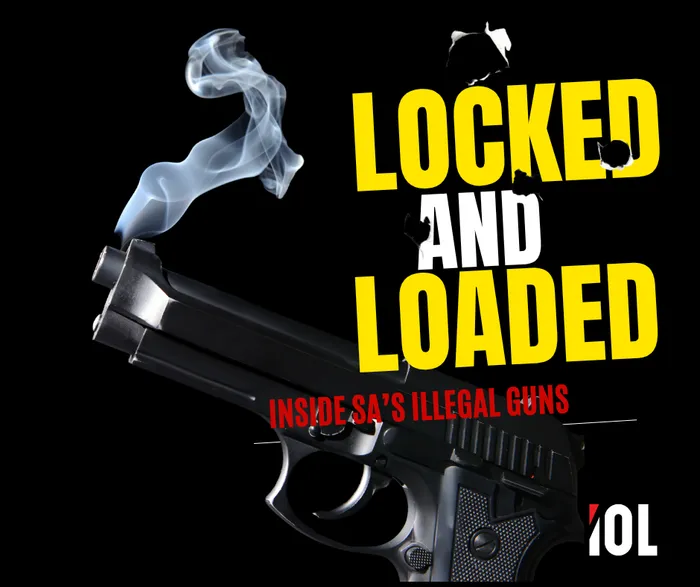
Stolen police firearms, missing civilian guns and smuggled weapons from neighbouring countries such as Namibia were fuelling a hidden trade that runs from Cape Town’s ganglands to towns and cities across the country.
Image: IOL Graphics
The smoking gun behind SA’s blood-soaked streets may be closer to home than many realise.
Stolen police firearms, missing civilian guns and smuggled weapons from neighbouring countries such as Namibia are moving easily through the country, often arriving first in the Mother City before being used in killings and gang wars, then travelling inland to arm other criminal groups involved in robberies, assassinations and cash-in-transit heists.
Recent mass shootings in Gauteng underline the deadly impact of these weapons: on October 21, two teenagers were killed and five others injured in a Westbury shooting, while in Reiger Park on November 1, six people were killed and three wounded in a drive-by attack.
According to analysts and police insiders, the theft of guns from law enforcement is “the root of the evil” fuelling the SA's hidden weapons trade, leaving families, shopkeepers and cash-in-transit drivers living in fear.
Over the past decade, more than 73 500 civilian firearms and over 7 000 police-issued weapons have been reported lost or stolen, with most never recovered.

99% of illegal guns come from inside SA
Image: IOL
Gun Free SA’s Claire Taylor said that while cross-border trafficking and conflict-era weapons still played a role, it was far smaller than it once was.
“Cross-border smuggling has declined significantly since the 1990s,” she said.
“Police data shows that just 56 illegal firearms were seized at ports of entry in 2023/24, compared to 179 in 2009/10.
"The few that are smuggled across borders tend to be high-calibre weapons, often destined for organised crimes like cash-in-transit heists, rhino poaching and targeted killings.
"SA’s 4 800-kilometre border is extremely difficult to police, and corruption at checkpoints only makes the job harder.”
She said smuggling methods vary, with some traffickers hiding weapons in legitimate cargo.
“In one case, military-grade guns from Namibia were found packed in fruit trucks heading for the Western Cape,” she said.
“The problem now is less about bulk cross-border smuggling and more about weapons circulating within SA itself.”
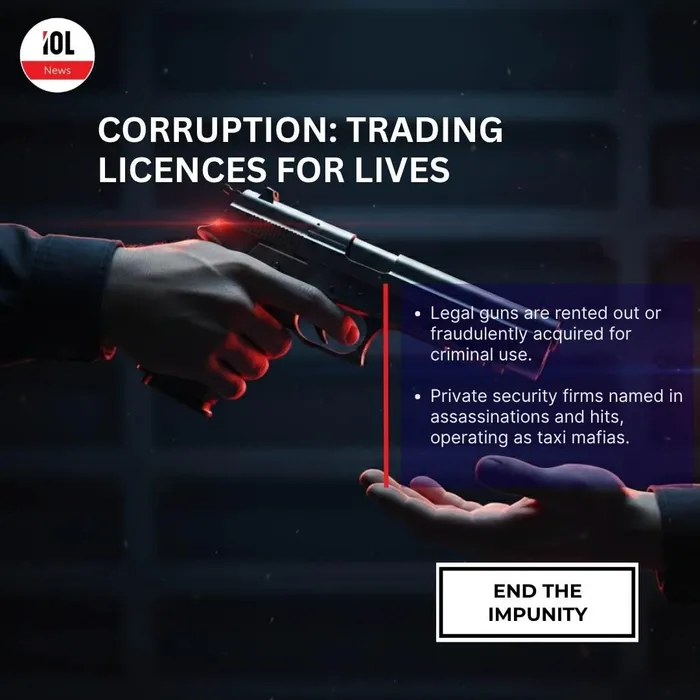
Legal guns are often rented out or fraudulently acquired for criminal use
Image: IOL
She said just over 7 000, averaging two a day, police-issued firearms were lost or stolen in the past decade, with a recovery rate of only 25%, suggesting many were illegally diverted rather than genuinely lost.
"Shockingly, 2.2m firearms are held by 502 government institutions with minimal oversight or accountability.
"And while the police report on loss and theft, but not on how many firearms it owns, each year, no other government department does this."
She said legal firearms used illegally or rented to criminals was also a big issue.
"An example is private security companies operating within the taxi industry using legally acquired firearms to conduct illegal operations on behalf of taxi mafias as described in the police commissioner’s testimony to the Madlanga Commission where he named eight private security companies implicated in assassinations and hits.
"It also includes fraud and corruption in the issuing of firearm licences and permits."
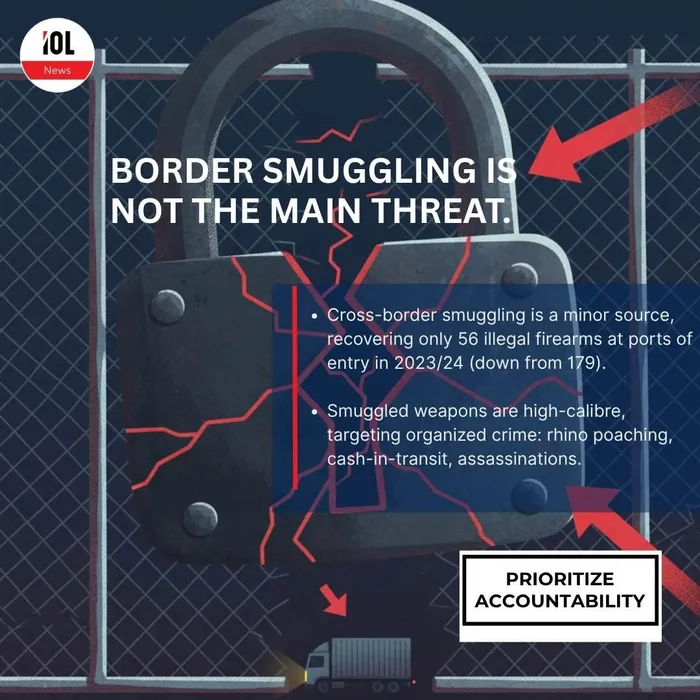
Smuggled weapons are high-calibre, targeting organised crime
Image: IOL
Anti-crime activist Yusuf Abramjee said the smuggling off weapons has been a problem for a long time.
"These guns end up in the hands of criminals," he said.
"There are thousands of illegal weapons in SA and it's a growing problem ... gangsters use these weapons in the on-going warfare."
A police insider from Grabouw said many of the weapons recovered in recent months were traced back to SA police stations.
“These are guns meant for official use that end up being rented out, swapped or stolen,” he said.
“Once they’re out, they go into criminal networks and are used in violent crimes like assassinations, armed robberies and gang shootouts.
"We’ve seen the same weapon used in multiple murders across different provinces.”
A Cape Town officer said most of the guns circulating in the city’s townships come from within SA, especially the Eastern Cape.
“The majority of illegal guns we pick up are police pistols or handguns that were reported missing,” he said.
“Some are sold by corrupt officers, others stolen from evidence rooms or during robberies.
"Cape Town is just a transit point — from here, they move up to Gauteng and KwaZulu-Natal.”
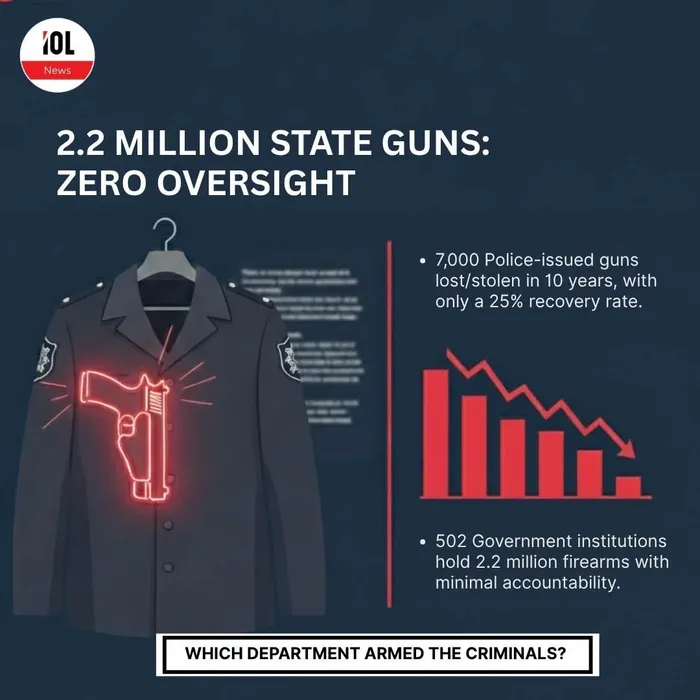
7,000 police-issued guns lost/stolen in 10 years
Image: IOL
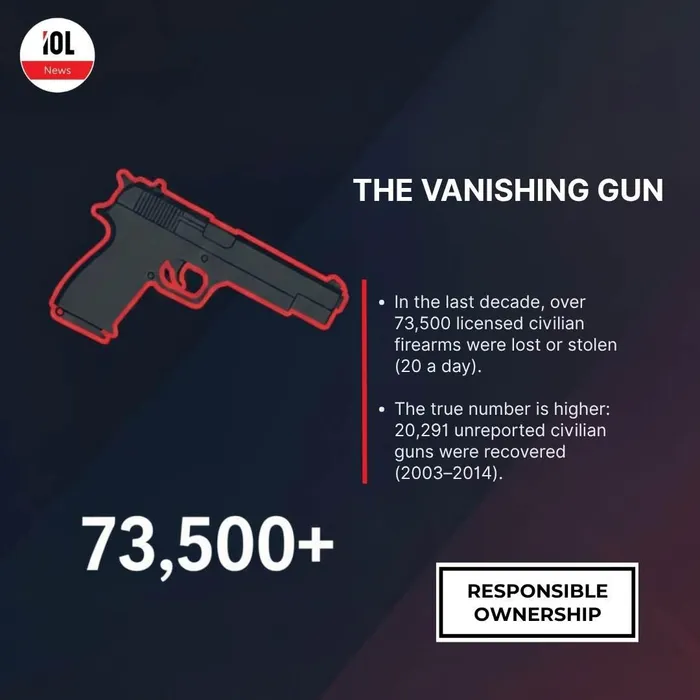
In the last decade, over 73,500 licensed civilian firearms were lost or stolen
Image: IOL
The foundation said the statistics tell their own story of a nation bleeding out.
"SA’s murder rate hovers around 45 per 100 000 people," the foundations' Christo van der Rheede said.
"In just one week in July 2025, 76 people were shot dead in Cape Town alone.
"Across gang hotspots, nearly 300 murders occur every quarter, with the Cape Flats dominating the nation’s top murder precincts.
"Children are the most innocent victims - more than one a day is killed in the Western Cape and in just three months of 2024, 79 young lives were lost, many in gang-related incidents.
"In Cape Town alone, between 90 and 130 gangs operate with a combined 100 000 members.
"Over seven recent months, police seized more than 1,500 firearms and nearly 40,000 rounds of ammunition, yet convictions for gang murders languish at an abysmal 2%-3%, less than 1% in 2026.
"In essence, more than 90% of gang killers escape justice."
Once caricatured as a Western Cape affliction, he said, it now festered in Gauteng’s Westbury, Eldorado Park and the East Rand, while Nelson Mandela Bay’s northern areas endure the same daily reality of turf wars, extortion and fear.
"Officials label these low-intensity warzones', but for residents, it is simply abandonment - a life lived under siege, waiting for the next volley of gunfire."
Van der Rheede said gangs must be treated as organised criminal enterprises under the Prevention of Organised Crime Act of 1998, with prosecutors pursuing racketeering, money-laundering and asset forfeiture relentlessly.